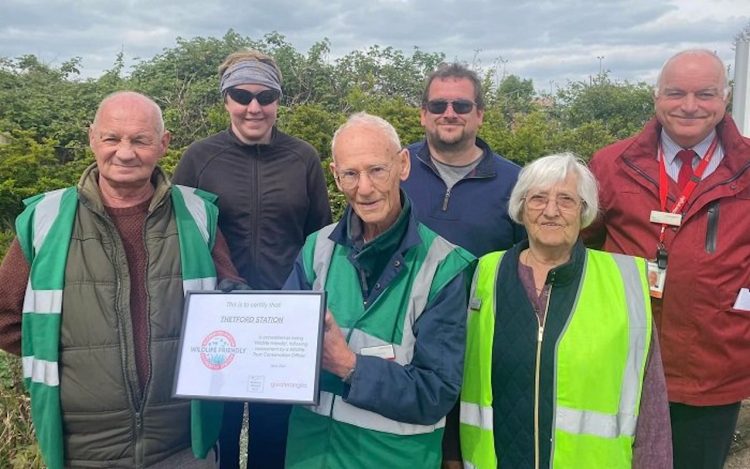Volunteers at Thetford station have won funding to put swift and bat boxes in place to protect them from habitat loss whilst boosting numbers
Greater Anglia's station adoption group have created a wildlife garden along the platforms with funding and planning permission provided by Breckland Council to put the six specially-designed boxes in place working with Network Rail for the installation at the top of the Victorian station building.
Over the last 25 years, both swift and bat populations have declined severely because of habitat loss with swifts now considered highly vulnerable.
Six ‘day and night' boxes have been installed by the group and are intended to house swifts through the summer months and bats throughout the year. Every box features a nesting chamber for a pair of swifts alongside a recess in the rear panel which allows bats to roost.

A solar-powered swift call emitting device has also been installed which will increase the chances of the boxes being found and used. Swifts are loyal to their nesting sites and the group is hoping to encourage a swift colony to form.
Lead volunteer, Fiona Rhind, said:
“We recently became a Wildlife-Friendly accredited station for the work we have done on the platforms, and we want to continually do more to show just what can be achieved in terms of greater biodiversity in an urban environment.
“At Thetford station we've planted native hedges, established a wildflower area and installed 15 bird boxes – which we were delighted to see become home to blackbird and robin chicks this year.
“It's wonderful that we can now provide a refuge for swifts and bats as well – as our native species need all the help they can get. We're really grateful to Breckland Council, Greater Anglia and Network Rail for supporting us in our aims to do everything we can to support our local wildlife.”
Greater Anglia and Norfolk Wildlife Trust recently awarded Thetford station a ‘Wildlife Friendly' accreditation in recognition of the volunteer ‘station adopters' team's amazing work to create a wildlife haven at the station.
James Hogg, Norfolk Wildlife Trust Corporate and Membership Development Officer, said:
“The alarming decline in the abundance of wildlife and the plight of species under threat means that just protecting the nature we have left is not enough; we need to put nature into recovery, and to do so at scale and with urgency. We are working to create a nature recovery network across Norfolk – and with fellow wildlife trusts across the UK – to create more space for wildlife.
“This project with Greater Anglia is a fantastic example of how people can transform nature-poor areas into new nature-rich places – and change the way we think about land, seizing opportunities to help nature outside traditional nature reserves.”
Greater Anglia's Customer and Community Engagement Manager, Alan Neville, said:
“I'd like to thank the volunteers at Thetford for the incredible work they are doing to support biodiversity locally. The railway is increasingly recognised as an important corridor for wildlife and thanks to initiatives like this, stations are becoming a vital part of that corridor which helps wildlife to move around the landscape and become more resilient to the effects of climate change and habitat loss.”
East Anglian railway stations are becoming havens for local wildlife due to the dedicated efforts of volunteers who have turned more than 6,800 square metres of railway land into flourishing wildlife gardens.
A recent survey revealed that Greater Anglia's station adopters have reported a good assortment of wildlife visiting their stations such as different types of butterflies alongside bees, slow worms, bats, foxes, deer and numerous varieties of birds, with the recording of over 200 different species.
Greater Anglia has pledged this land to WildEast which aims to inspire nature recovery with a bid to restore 20% of East Anglia back to nature by 2050 and also joins the rest of the rail industry in pledging to make stations across Britain more sustainable.